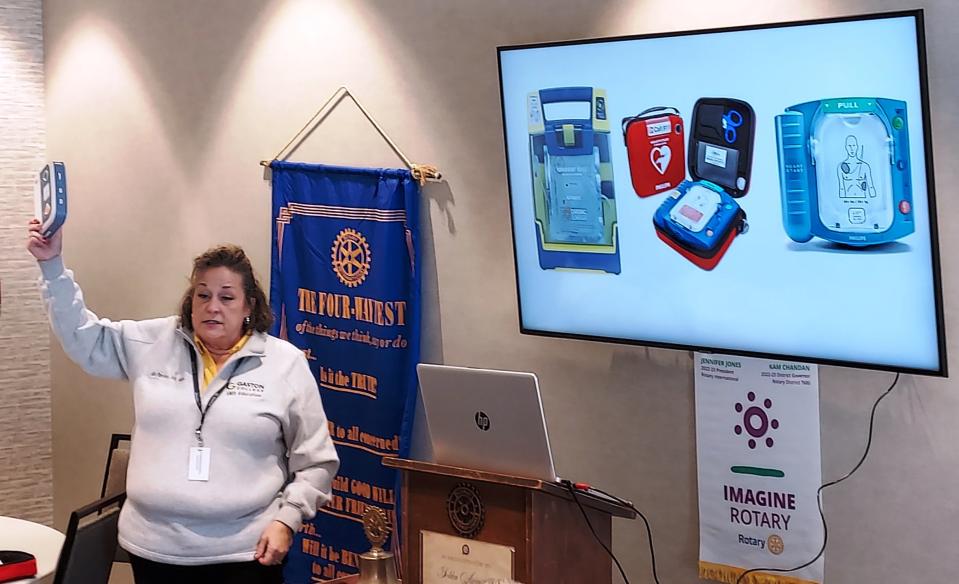Prepare to be a lifesaver by learning CPR
If you suffer cardiac arrest anywhere other than in a hospital, you have a 90% chance of dying.
In 2022, more than 800 Gaston County residents died of the 900 who went into cardiac arrest while not in a hospital. Nationwide last year, cardiac arrest outside of a hospital setting took the lives of 356,855 victims.

What made the difference for the fortunate 10%? When their hearts stopped beating, someone close by had been trained in CPR, or in using a defibrillator, and quickly administered aid until emergency medical professionals arrived.
More people trained in these easy-to-learn skills would result in more lives being saved.
That is the message delivered to members of the Belmont Rotary Club recently by Kimberly Parsley, who directs the emergency medical science education program at Gaston College. She previously worked many years as a critical care paramedic in Cleveland and Gaston counties.

Certified as a paramedic at Cleveland Community College, she earned an associate's degree in emergency medicine at Gaston College and a bachelor's degree in emergency medical care and healthcare administration at Western Carolina University.
"Cardiac arrest and a heart attack are not the same thing," Parsley told Rotarians. "Cardiac arrest is an electrical problem; a heart attack is a plumbing problem." She explained the difference as follows:
Sudden cardiac arrest, such as the case televised recently during an NFL game, occurs often without warning when an electrical malfunction in the heart causes an irregular heartbeat (arrhythmia), stopping the heart from pumping blood to the brain, lungs and other organs. When this happens, a person loses consciousness and has no pulse. Death occurs within minutes unless the victim receives treatment. Immediate application of CPR or use of a defibrillator is required for cardiac arrest victims.

A heart attack occurs when a blocked artery prevents oxygen-rich blood from reaching a section of the heart. If the blocked artery is not reopened quickly, the part of the heart normally nourished by that artery begins to die. The longer a person goes without treatment the greater the damage. CPR and use of a defibrillator are not necessary for a heart attack victim who is breathing and has a pulse.
Parsley showed Rotarians several models of defibrillators, also known as AEDs (automated external defibrillators). These small devices, when turned on, provide easy-to-follow voice instructions on how to use the machines to deliver a shock and restart a cardiac arrest victim's heart.
She also demonstrated the chest compressions used in hands-only CPR, which now is the preferred method. It has been determined that breathing into the victim is not necessary and the practice now is not advised.
Saving the life of a cardiac arrest victim can be as simple as one, two, three, Parsley said. (1) Dial 911; (2) Perform chest compressions; (3) Use a defibrillator, if available.
In person classes in performing CPR and using defibrillators, and more extensive certification courses, are available in Gaston County. Contact AHA CPR instructor Melvin Burris at 980-522-1418.
Online training also is available. But be careful to use only accredited providers, some of which include the American Red Cross, the American Heart Association and the National CPR Foundation.
Rotary is an international service organization with 1.4 million members in more than 200 countries. "Service Above Self" is the Rotary motto. Rotarians work together to promote peace, fight disease, support education, grow local economies and protect the environment.
Belmont Rotary Club, which will celebrate its 100th anniversary in 2025, meets for lunch and a program on local topics each Wednesday, 12:30 - 1:30 p.m., at the Home2 Suites by Hilton in Belmont. Guests interested in learning more about local businesses and issues and how Rotary serves the community are welcome. For more information, visit www.belmontrotaryclub.com.
Belmont Police offers free classes
Belmont Police Department will offer free CPR/AED courses throughout the month of February in recognition of American Heart Month. Course events are scheduled from 6 to 8 p.m. on Feb. 10, Feb. 17 and Feb. 28.
The American Heart Association “Family & Friends CPR” course is a non-certification course designed for those who want to learn the lifesaving skills of CPR without needing a certification for employment or other purposes.
Those who are interested may reserve their seat by following the links listed on the Belmont Police Department Facebook and Instagram pages.
For more information, contact Sgt. Green at agreen@cityofbelmont.org
This article originally appeared on The Gaston Gazette: Prepare to be a lifesaver by learning CPR

